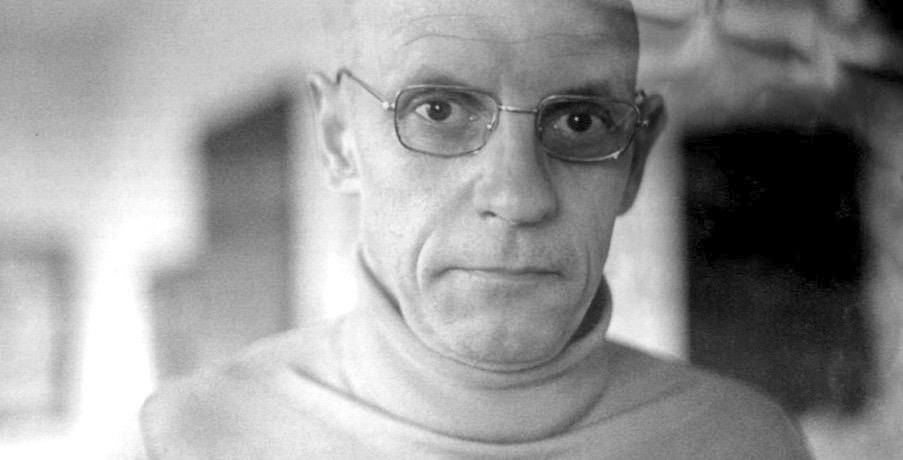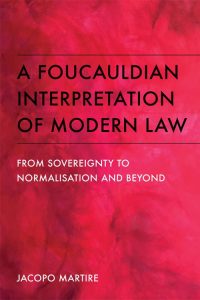
Thursday, 3 December 2020, from 2pm to 4pm EET (UTC+2), Zoom.
The theme for the events of the Helsinki Socio-Legal Initiative (HSLI) during the 2020-2021 academic session address the various ways in which Michel Foucault’s work has influenced the study of law. This ranges from analyses of disciplinary and governmental power to the more ethically attuned emphases of his later works. The aim of the events is to encourage the exchange of ideas that either deal with Foucault directly or have been inspired by the various theoretical frameworks that his philosophy has provided.
This first event of the ongoing academic year is built as a ‘meet the author’ session with Dr Jacopo Martire (Bristol) who will present his book A Foucauldian Interpretation of Modern Law: From Sovereignty to Normalisation and Beyond (Edinburgh University Press 2017). The presentation will be followed by an opportunity for q&a and general discussion. Dr Martire has kindly provided copies of chapters 1 and 4 of his book as background material, and we encourage participants to familiarise themselves with it prior to the event.
programme
- 2:15pm Seminar opening
Professor Panu Minkkinen (Helsinki) - 2:25pm A Foucauldian Interpretation of Modern Law
Dr Jacopo Martire (Bristol) - 3:15pm Discussion
- 3:45pm End of seminar
The event is open to all interested, but registration is required. Kindly register by filling in the form by Tuesday, 1 December 2020. You will receive a link to the background material and the Zoom link by email after your registration has been successfully completed. All registration data will be deleted after the event.
About The book
 Although Foucault is certainly one of most influential scholars of our age, it is safe to say that law for Foucauldian scholarship is something like an ‘indigestible meal’. This is due to the liberal challenge that haunts Foucauldian approaches to law, which goes by the name of the ‘expulsion thesis’: how is it possible to analyse law through Foucauldian lenses if Foucault himself claimed (albeit cursorily) that law, in modern times, has been colonised by other disciplines? Foucauldian responses had been attempted but they appear – for all their sophistication – not only rather unconvincing but also advocating a sort of recourse to a language of rights and law that is – at its core – undistinguishable from that of liberalism. How is that possible? I suggest that the answer lied in the fact that the idea of law – in its most foundational concepts – is accepted as a sort of black box in modern legal theory and therefore we are unable to question properly its structural limits. To overcome this limitation, my work attempts a genealogy, sketching the most basic structure or syntax of the modern legal discourse.
Although Foucault is certainly one of most influential scholars of our age, it is safe to say that law for Foucauldian scholarship is something like an ‘indigestible meal’. This is due to the liberal challenge that haunts Foucauldian approaches to law, which goes by the name of the ‘expulsion thesis’: how is it possible to analyse law through Foucauldian lenses if Foucault himself claimed (albeit cursorily) that law, in modern times, has been colonised by other disciplines? Foucauldian responses had been attempted but they appear – for all their sophistication – not only rather unconvincing but also advocating a sort of recourse to a language of rights and law that is – at its core – undistinguishable from that of liberalism. How is that possible? I suggest that the answer lied in the fact that the idea of law – in its most foundational concepts – is accepted as a sort of black box in modern legal theory and therefore we are unable to question properly its structural limits. To overcome this limitation, my work attempts a genealogy, sketching the most basic structure or syntax of the modern legal discourse.
Through my genealogical reconstruction (which draws both from the history of political philosophy and on the three seminal revolutions – English, French, and American – that have established the constitutional horizon of modernity) I propose that modern law and modern biopolitical forms of power developed symbiotically and that, to the extent that while modern law establishes the existence of a universal legal subject, law’s functioning is made possible by the homogenization of society through normalising practices. On this basis, I argue that – in the context of Zygmunt Bauman’s vision of modernity as a ‘liquid society’ – we are moving towards the absolute limit of the normalizing complex. As normalising strategies are increasingly unable to homogenise a social body which is increasingly composed by individualised and multifaceted subject, modern law faces two interconnected challenges: a normative one (how can normalising laws properly reflect the wills of a mass of differentiated virtual individuals?), and a functional one (how can normalising laws effectively regulate a new protean social body?).
About the author
 Dr Jacopo Martire is Senior Lecturer in Legal Theory and Deputy LLM Director at the University of Bristol. He teaches Jurisprudence, European Union Law, and Social and Legal Theory. He joined the University of Bristol Law School in January 2018 having previously held teaching positions at the University of Stirling, Manchester University, and King’s College London. Dr Martire’s main area of research is in legal and political theory with a specific focus on a reconstruction of the fundamental ideological structures of modern law in the light of Michel Foucault’s theories. His main contribution in this respect is his monograph.
Dr Jacopo Martire is Senior Lecturer in Legal Theory and Deputy LLM Director at the University of Bristol. He teaches Jurisprudence, European Union Law, and Social and Legal Theory. He joined the University of Bristol Law School in January 2018 having previously held teaching positions at the University of Stirling, Manchester University, and King’s College London. Dr Martire’s main area of research is in legal and political theory with a specific focus on a reconstruction of the fundamental ideological structures of modern law in the light of Michel Foucault’s theories. His main contribution in this respect is his monograph.
Currently, Dr Martire is also developing his research in three directions. First, he is exploring the question of the ‘Other’ in its politico-philosophical declension, and in particular in relation to EU law. Second, he is analysing the interrelation between law and new forms of technoregulation, scrutinising how technological advancements (especially in the field of automation and algorithmic governance) challenge the classical legal model of ‘command and control’ and the legal-political assumptions linked to it. Third, he is examining the ‘underbellly of law’ by investigating the aporias and paradoxes of the modern legal discourse through the medium of cinema and literature.
